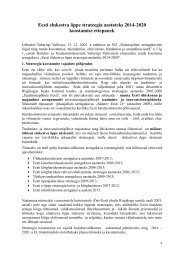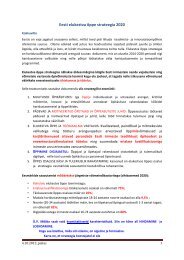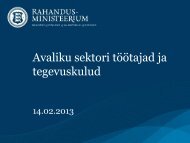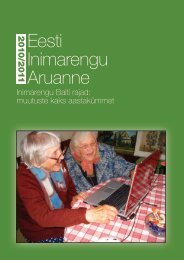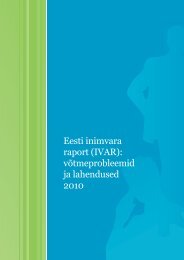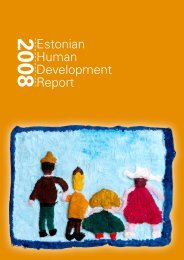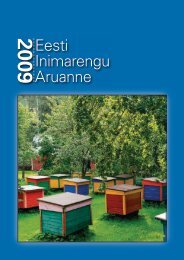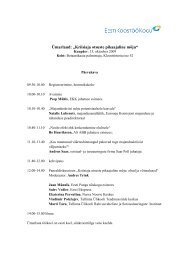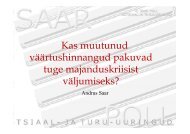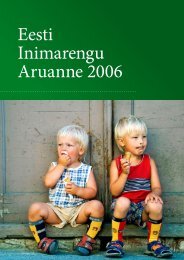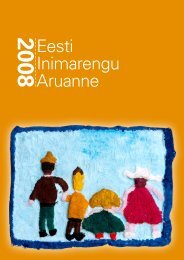DEVELOPMENT
The pdf-version - Eesti Koostöö Kogu
The pdf-version - Eesti Koostöö Kogu
You also want an ePaper? Increase the reach of your titles
YUMPU automatically turns print PDFs into web optimized ePapers that Google loves.
2.4<br />
The information environment<br />
and freedom of the media<br />
Peeter Vihalemm<br />
The freedom of media is closely related to general political<br />
freedom. Through the years, this has been high, based<br />
on both the Freedom House (Freedom of the Press) and<br />
Reporters Without Borders indices (22 nd and 11 th in the<br />
world, in 2012 and 2013, respectively).<br />
From the table, we see that in the majority of the<br />
countries used as reference states in this report, general<br />
developmental success is connected to great media freedom.<br />
The exceptions are Singapore, partly also Israel,<br />
Chile and South Korea, and during the last couple of<br />
years, Hungary (Table 2.4.2).<br />
For many years, the media in the Nordic countries<br />
has been considered to be the freest. According to<br />
the Freedom House assessments, Estonia, along with<br />
Germany and the U.S., are positioned between 14 and<br />
22, slightly ahead of the Czech Republic. The position<br />
of Lithuania and Latvia was near this in 2007, but in<br />
subsequent years, has sharply decreased. This is related<br />
to the significant withdrawal of foreign capital from the<br />
Latvian and Lithuanian media markets from 2008 to<br />
2010, similarly to many other Eastern and Central European<br />
countries. The new domestic owners (so-called<br />
“oligarchs”) have tried to use the media in their political<br />
and economic interests, and this has significantly<br />
restricted the freedom of the media, and has reduced<br />
the expert evaluations of it (Lauk 2012). At the media<br />
conference at Tallinn University, in May of 2012, it was<br />
affirmed that the situation of the Estonian media differs<br />
greatly from the other Eastern and Central Europe countries,<br />
in that we have no oligarchs who would control<br />
the media to an ever more significant extent (Kadastik<br />
2012; Raudsaar 2012).<br />
The great decrease in the freedom of the media in<br />
Hungary during the last few years (Table 2.4.2) can be<br />
explained by the media law passed at the end of 2010,<br />
which promoted widespread protests by the public, as<br />
well as by the European Parliament. According to the<br />
2012 assessment by Freedom House, Hungary is the only<br />
country in the European Union where the press is not<br />
free, but rather, only partly free.<br />
Here, it should be added that, in Russia, the freedom<br />
of media, like political freedom generally, has undergone<br />
a reversal since 1994, especially in the last decade, during<br />
Putin’s time in power. This has resulted in Russia being<br />
given an assessment of not free, starting in 2006.<br />
As far as Internet freedom is concerned, Estonia has<br />
placed first in the world for the second year in a row,<br />
according to Freedom House’s Freedom on the Net index<br />
(Table 2.4.3.). In the survey of this index, Estonia’s IT<br />
development and Internet services have been given a very<br />
high assessment – as far as communications technology<br />
Table 2.4.1<br />
Positions of various states in the freedom of media<br />
ranking 2012–2013<br />
Freedom House<br />
2012<br />
(197 countries)<br />
Rank<br />
Status<br />
Rank<br />
Finland 1. Free 1. Good<br />
Norway 1. Free 3. Good<br />
Sweden 1. Free 10. Good<br />
Denmark 5. Free 6. Good<br />
Netherlands 5. Free 2. Good<br />
Switzerland 5. Free 14. Good<br />
Ireland 13. Free 15. Good<br />
New Zealand 16. Free 8. Good<br />
Estonia 22. Free 11. Good<br />
Costa Rica 25. Free 18. Good<br />
Czech Republic 25. Free 16. Good<br />
Reporters Without<br />
Borders 2013<br />
(179 countries)<br />
Assessment of<br />
media freedom<br />
Slovakia 31. Free 23. Satisfactory<br />
Lithuania 40. Free 33. Satisfactory<br />
Poland 47. Free 22. Satisfactory<br />
Slovenia 47. Free 35. Satisfactory<br />
Taiwan 47. Free 47. Satisfactory<br />
Uruguay 51. Free 27. Satisfactory<br />
Latvia 54. Free 39. Satisfactory<br />
Israel 65. Free 112.<br />
Chile 67. Partly free 60.<br />
Noticeable<br />
problems<br />
Noticeable<br />
problems<br />
South Korea 68. Partly free 50. Satisfactory<br />
Hungary 78. Partly free 56.<br />
Noticeable<br />
problems<br />
Singapore 150. Not free 149. Difficult situation<br />
Russia 172. Not free 148. Difficult situation<br />
China 187. Not free 173.<br />
Very serious<br />
situation<br />
Belarus 193. Not free 157. Difficult situation<br />
North Korea 197. Not free 178.<br />
Source: www.freedomhouse.org; www.rsf.org<br />
Very serious<br />
situation<br />
78<br />
Estonian Human Development Report 2012/2013



